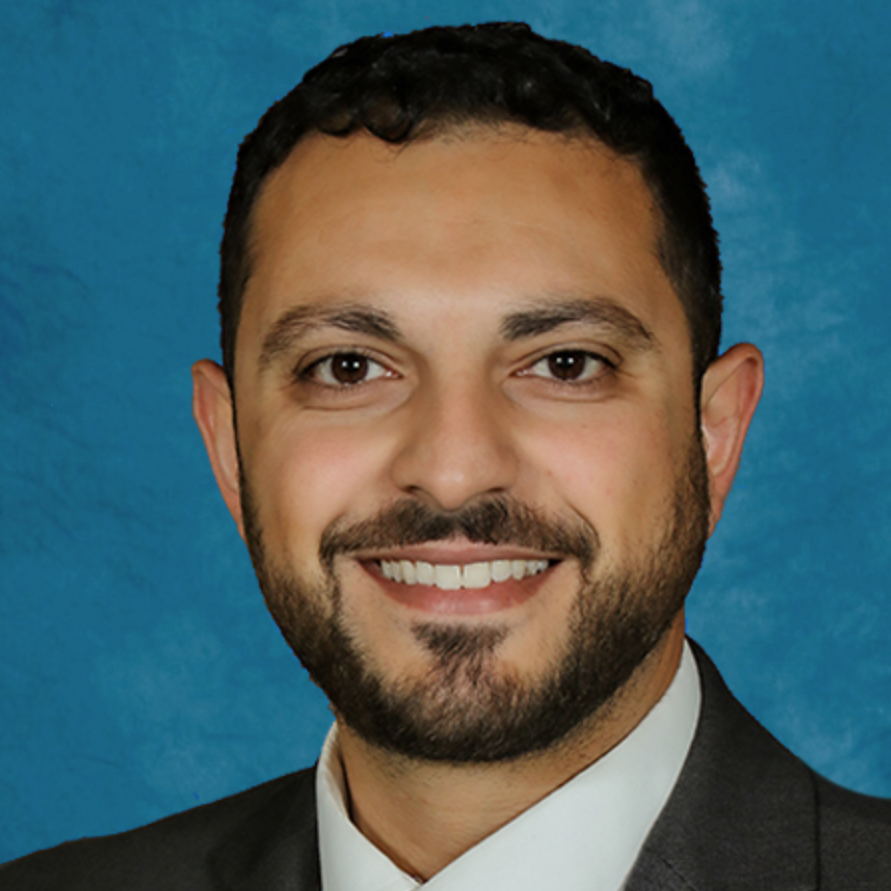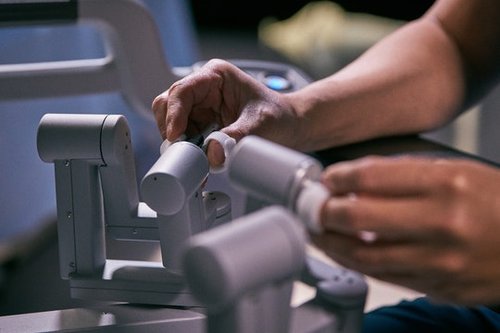

Mina Saeed
Surgeon
800 Austin St East Tower, Ste. 563 Evanston IL, 60202About
Dr. Mina Saeed is a board certified, and fellowship trained bariatric and general surgeon, practicing in Evanston, IL. He is currently accepting new bariatric and general surgery patients, at AMITA-St. Francis Hospital. Dr. Saeed specializes in minimally invasive surgery, such as robotic surgery, and other advanced laparoscopic and endoscopic techniques.
His passion is weight-loss surgery. As a bariatric patient himself, he intimately understands the broad impact obesity has on the quality of one's life. Through his success with bariatric surgery, he is driven to help others achieve their health and weight-loss goals.
To make an appointment, please visit www.surg-associates.com or call 847-869-0522. For direct questions, you can reach out to him through the "Patient Questions" portal. Facebook and Instragram sites are currently under development.
Mina Saeed's Videos
Education and Training
Rush Medical College MD 2013
Board Certification
American Board of Surgery
Provider Details

Mina Saeed's Expert Contributions
How long does a subtotal colectomy surgery take?
3-4 hours on average, but this depends on the technique and the pathology within the abdomen and colon. Best of luck and wishing you a speedy recovery. READ MORE
How long are you sedated for an endoscopy?
Yes, for upper endoscopy, it would be very uncomfortable without sedation. A colonoscopy is sometimes done without sedation, if the patient so chooses, but isn't very comfortable to experience awake either. READ MORE
Should I be worried about general anesthesia?
Complications from general anesthesia are quite rare. In general, if someone has good functional capacity (i.e. able to climb 1-2 flights of stairs without being significantly short of breath and labored), they will tolerate anesthesia well. If you have pulmonary problems, such as severe asthma or COPD, you may have problems being extubated (removal of the breathing tube). If you have a significant cardiac history (heart-attack within the past year, coronary artery bypass, multiple stents, or are an active smoker with diabetes, you should consult with your doctor about your concerns regarding general anesthesia. READ MORE
What is the most common treatment for gallstones?
Surgery is the most common and effective treatment for gallstones. To date, there is no proven medication to dissolve or pass the gallstones, and there are no radiofrequency/laser treatments, as is the case with kidney stones. READ MORE
Can a rectal exam detect hemorrhoids?
A rectal exam and anoscopy are the best detectors of hemorrhoids. READ MORE
Bad abdomen pains?
This is certainly something that should be investigated by a Gastroenterologist or General Surgeon. I hope you find answers and relief soon. READ MORE
Is local anesthesia safe for diabetics?
Absolutely. READ MORE
I was told I have an inflamed stomach but I’m not getting better?
You should also abstain from caffeine, soda, alcohol, and smoking. These all contribute to increased acidity, and perpetuates the inflammation. Taking peptobismol may help relieve some of your symptoms. READ MORE
Is it normal to bleed after a colonoscopy?
If they took biopsies and removed polyps, some bleeding is to be expected. Heavy, bright red blood should raise concern, and would be a reason to contact your doctor. READ MORE
Which surgery is best for inguinal hernia treatment?
An inguinal hernia repair can be fixed through an open or minimally invasive technique. Over 95% of hernia repairs are done using a synthetic mesh, whether it's open or laparoscopic. The chance of hernia recurrence is fairly similar amongst the two, but the recovery is shorter after the minimally invasive approach. READ MORE
What is the success rate of colon cancer surgery?
The "success rate" is defined by the surgeons ability to remove all the tumor, and adequate number of lymph nodes to stage you. This can vary depending on the size, location, and invasiveness of the tumor. Tumors that have not spread to lymph nodes, or outside the colon, and are completely removed, have a ~95% cure rate. On the other spectrum, if the tumor has invaded the liver, lungs, or any other organs outside the colon, the survival rate is ~10%. READ MORE
What type of anesthesia is used for colectomy?
General anesthesia. READ MORE
What sedation is used for abdominal surgery?
It's almost always general anesthesia. READ MORE
How quickly do you lose weight after a gastric sleeve?
Excellent question. Weight loss begins the day you leave the hospital. Your calories will be extremely restricted for the first 4-5 weeks. At that point, you will be allowed to eat "regular food." Most people lose the majority of their weight during the first 9-12 months. It is at this time, that the body has transformed greatly, and it's important for patients to realize that it now requires far fewer calories to gain weight. READ MORE
What are the side effects of colon resection surgery?
In general, up to 1/3 of the colon can be removed without much change in a patient's life. Taking more of the colon, can lead to increased frequency, and looseness of stools. READ MORE
Abdominal discomfort/pain?
Gallbladder stones can cause abdominal pain, but that would be predominantly on the right side of the abdomen, under the ribs, and sometimes in the center, under your breast bone. Diarrhea along with the abdominal discomfort you are describing, may be due to pancreatic insufficiency. Talk to your doctor to see if you qualify for a fecal fat stool sample to see how well you're able to digest fats, which is initiated by the pancreas. READ MORE
Pain in lower legs?
Great question. The answer is yes, you can do abdominal workouts, but the hernia may grow in size, and eventually cause pain and discomfort. Surgical repair is a mild procedure, and done as an outpatient in almost all cases. READ MORE
What foods can you not eat after gastric sleeve?
After a sleeve, your stomach is greatly restricted in volume. It is not, however, a computer. That means, that certain foods, like ice cream, milk-shakes, and other soft sweets can easily pass through the narrow sleeve, but contain a tremendous amount of calories. This leads to failure to lose weight, or weight gain. After a sleeve gastrectomy, you should still make good choices about what you eat, because your stomach won't reject the unhealthy foods. You should avoid alcohol, smoking, NSAIDS, and oral steroids. READ MORE
What is the best position to sleep after hiatal hernia surgery?
I don't think that has been studied, but I would recommend sleeping in the most comfortable position for you. READ MORE
Do small gallstones require treatment?
The size of the gallstones does not usually play into this determination, unless they are larger than 2 cm. Small gallstones, may pass through the gallbladder, or can cause blockage of the duct, which leads to pain, nausea, bloating, and a host of other uncomfortable symptoms. If you are not having any symptoms, then your gallstones can be left alone. READ MORE
Areas of expertise and specialization
Faculty Titles & Positions
- Medical Director-Trauma Services AMITA-St Francis Hospital 2021 - Present
- Clinical Assistant Professor of Surgery University of Illinois-Chicago 2021 - Present
Professional Memberships
- ASMBS
Fellowships
- Scripps Clinic-San Diego Advanced Minimally Invasive and Bariatric Surgery
Fellowships
- Scripps Clinic-San Diego0Advanced Minimally Invasive and Bariatric Surgery
Professional Society Memberships
- American Society for Metabolic and Bariatric Surgery, and the Society of American Gastrointestinal and Endoscopic Surgeons. He is also certified in Basic Life Support, Advanced Cardiac Life Support, and Advanced Trauma Life Support
Mina Saeed's Practice location
Mina Saeed's reviews
Write ReviewMedia Releases
Get to know Bariatric Surgeon, Dr. Mina Saeed, who serves patients in Evanston, Chicago, and surrounding suburbs in Illinois.
A board-certified and fellowship-trained bariatric surgeon, Dr. Saeed is affiliated with Surgical Associates, SC, serving as the Medical Director of Trauma Surgery at AMITA St. Francis Hospital-Evanston.
Established in the 1960s, the board-certified physicians of Surgical Associates, SC in Evanston, Illinois have built a reputation for surgical excellence. They are proud to offer patients the most comprehensive general surgical services with state-of-the-art equipment at AMITA St. Francis Hospital. Their capable physicians provide a full spectrum of operative procedures encompassing a broad array of surgical disease states.
Throughout his academic career, Dr. Saeed received his Bachelor of Science degree in Biology from the University of Wisconsin-Milwaukee, and earned his medical degree from the Rush Medical College. He then went on to complete his residency in General Surgery at the University of Illinois at Chicago-Metropolitan Group Hospitals, and his fellowship in Advanced Minimally Invasive and Bariatric Surgery at Scripps Clinic-San Diego.
Distinguished as a Fellow of the American College of Surgeons (FACS), this doctor is board-certified in bariatric surgery, trauma surgery and general surgery by the American Board of Surgery (ABS).
In order to remain up to date in his field, he is an active member of the American Society for Metabolic and Bariatric Surgery, and the Society of American Gastrointestinal and Endoscopic Surgeons. He is also certified in robotic surgery, and has completed over 50 advanced robotic procedures. Through the use of this type of minimally invasive surgery, patients are afforded shorter recovery times and hospital stays, and a quicker return to their life.
Active in academia, Dr. Saeed serves as an Assistant Clinical Professor at the University of Illinois at Chicago College of Medicine, and at the University of California-Riverside School of Medicine.
His passion for bariatric surgery stems from his own experience as a bariatric patient. Having successfully lost weight after bariatric surgery, he gained an unmatched dedication to weight-loss surgery, and obesity as a disease. As a part of a comprehensive weight-loss center, we have a registered dietician, psychologist, and medical weight-loss specialist, to help you patients along their weight-loss journey.
On a more personal note, he is fluent in both English and Arabic.
Recommended Articles
- Does My Diet Raise My Risk of Getting Appendicitis?
The appendix found in the human body was long the subject of debate among doctors all over the world in their journals and reviews. However, very few of these debates have turned out to be worthy of serious consideration because the majority of doctors have conceded the fact that the appendix serves...
- What Are the Different Types of Hysterectomies?
Removing the womb or uterus surgically has always been an option for women troubled by severe bleeding, uncontrolled fibroid growth, painful endometriosis, and spreading cancer. Removing the source of the problem has been considered the best remedy for relieving these painful symptoms that...
- Reasons Why You Need a Biopsy
OverviewA biopsy is a procedure that involves the removal of a sample tissue in the body to examine it closely under a microscope. The tissue is mainly examined to diagnose a certain disease. Some may use a needle or surgical methods to remove any lumps or suspicious nodules in the body. Some...
- How to Prepare for a Colonoscopy
A colonoscopy is an examination that lets your health practitioner view the lining of your colon (large intestine). A thin and flexible tube known as a colonoscopy is used to thoroughly view the colon. A Colonoscopy is also applied when screening for precancerous or cancer growths inside the colon....
- How Is Liver Cancer Diagnosed?
How is Liver Cancer Diagnosed?Liver cancer is a common type of cancer which begins in the liver cells, or hepatocytes. Liver cancer is a cancer which affects one of the largest and most important organs of the body. Liver cancer is type of cancer which, when diagnosed at early stages, can be...
- How to Prepare for an Ablation
An ablation is a surgery that removes body tissue. Once your ablation has been discussed, it is wise to consider some shared risk factors which you may control. The following shared risk factors are important to consider before your ablation....
Nearest Hospitals
EVANSTON HOSPITALl
2650 RIDGE AVE EVANSTON IL 60201PRESENCE SAINT FRANCIS HOSPITALl
355 RIDGE AVE EVANSTON IL 60202







